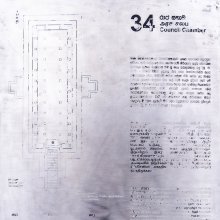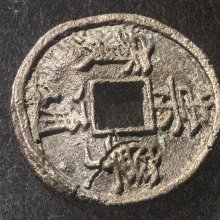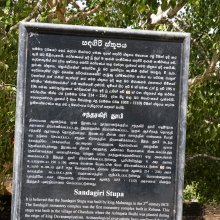Arasa, Arasha: 15 definitions
Introduction:
Arasa means something in Hinduism, Sanskrit, Marathi, Jainism, Prakrit, Hindi. If you want to know the exact meaning, history, etymology or English translation of this term then check out the descriptions on this page. Add your comment or reference to a book if you want to contribute to this summary article.
Images (photo gallery)
(+2 more images available)
In Hinduism
Yoga (school of philosophy)
Source: ORA: Amanaska (king of all yogas): A Critical Edition and Annotated Translation by Jason BirchArasa (अरस) refers to “that which is tasteless”, according to the Bṛhadāraṇyikopaniṣat 3.8.6, 8.—Accordingly, while describing the absolute nature of Brahma: “Gārgi said, ‘Yājñavalkya, that which is above the sky, below the earth, between the two and called [past, present and future], is stitched and cross-stitched in what?’ Yājñavalkya said, ‘Gārgi, the Brahmins call that very [thing] the imperishable one. [It is] not coarse, not particulated, not short, not long, bloodless, unlubricated, shadowless, undarkened, windless, spaceless, unattached, tasteless (arasa), scentless, invisible, inaudible, speechless, mindless [...]’”.

Yoga is originally considered a branch of Hindu philosophy (astika), but both ancient and modern Yoga combine the physical, mental and spiritual. Yoga teaches various physical techniques also known as āsanas (postures), used for various purposes (eg., meditation, contemplation, relaxation).
Languages of India and abroad
Marathi-English dictionary
Source: DDSA: The Molesworth Marathi and English Dictionaryarasa (अरस).—a S (Esp. in poetry.) Wanting juice, lit. fig. jejune, insipid, dry.
--- OR ---
arasā (अरसा).—m ( H) A mirror or looking-glass. Ex. tavyācā jātāṃ burasā || maga tōci hōya sahaja a0 || araśāpuḍhēṃ kōḷasā Used where a thing remarkably foul, vile, base, or bad is compared with a thing remarkably bright, pure, fine, or good. ara- śā sārakhā Bright and clear as a mirror;--used lit. fig. of houses, rooms, accounts, handwriting, business. araśāsārakhēṃ tōṇḍa-mukha-cēharā A clear complexion or beautiful countenance.
--- OR ---
ārāṣa (आराष).—See under अ.
--- OR ---
ārāsa (आरास).—See under अ.
Source: DDSA: The Aryabhusan school dictionary, Marathi-Englisharasā (अरसा).—m A mirror.
--- OR ---
arāṣa (अराष) [-sa, -स].—f The state of being splendidly fitted up.
--- OR ---
ārasā (आरसा).—See under अ.
--- OR ---
ārāṣa (आराष) [-sa-ārī, -स-आरी].—See under अ.
Marathi is an Indo-European language having over 70 million native speakers people in (predominantly) Maharashtra India. Marathi, like many other Indo-Aryan languages, evolved from early forms of Prakrit, which itself is a subset of Sanskrit, one of the most ancient languages of the world.
Sanskrit dictionary
Source: DDSA: The practical Sanskrit-English dictionaryArasa (अरस).—a.
1) Sapless, not juicy, tasteless, insipid; अरसं नित्यमगन्धवच्च यत् (arasaṃ nityamagandhavacca yat) Kaṭh.3.15.
2) Dull, flat.
3) Weak, having no strength, inefficacious. वृश्चिकस्यारसं विषमरसं वृश्चिक ते विषम् (vṛścikasyārasaṃ viṣamarasaṃ vṛścika te viṣam) Ṛgveda 1.191.16.
4) One who has no sense of appreciation. किमस्या नाम स्यादरसपुरुषानादरशतैः (kimasyā nāma syādarasapuruṣānādaraśataiḥ) | N.
5) Unhappy. कृपणं वत यज्जनः स्वयं सन्नरसो व्याधिजरा- विनाशधर्मा (kṛpaṇaṃ vata yajjanaḥ svayaṃ sannaraso vyādhijarā- vināśadharmā) Bu. ch.5.12.
-saḥ No juice, absence of juice.
--- OR ---
Ārāsa (आरास).—Tumultuous noise; ततमानवजारासा (tatamānavajārāsā) Śiśupālavadha 11.34.
Derivable forms: ārāsaḥ (आरासः).
Source: Cologne Digital Sanskrit Dictionaries: Shabda-Sagara Sanskrit-English DictionaryArasa (अरस).—mfn.
(-saḥ-sā-saṃ) 1. Insipid, tasteless. 2. Dull, flat, (as a composition.) E. a neg. rasa flavour.
Source: Cologne Digital Sanskrit Dictionaries: Benfey Sanskrit-English DictionaryArasa (अरस).—adj. tasteless, insipid.
Arasa is a Sanskrit compound consisting of the terms a and rasa (रस).
Source: Cologne Digital Sanskrit Dictionaries: Cappeller Sanskrit-English DictionaryArasa (अरस).—[adjective] tasteless, insipid (subj. & obj.).
Source: Cologne Digital Sanskrit Dictionaries: Monier-Williams Sanskrit-English Dictionary1) Arasa (अरस):—[=a-rasa] mf(ā)n. sapless, tasteless, [Nṛsiṃha-tāpanīya-upaniṣad]
2) [v.s. ...] not having the faculty of tasting, [Śatapatha-brāhmaṇa xiv]
3) [v.s. ...] weak, effectless, having no strength, [Ṛg-veda i,191,16; Atharva-veda]
4) [v.s. ...] m. absence of sap or juice, [cf. Lexicographers, esp. such as amarasiṃha, halāyudha, hemacandra, etc.]
5) Ārasa (आरस):—[=ā-rasa] [from ā-ras] m. a scream, shout, [Mālavikāgnimitra]
6) Ārāsa (आरास):—m. a scream, shout, [Śiśupāla-vadha]
Source: Cologne Digital Sanskrit Dictionaries: Yates Sanskrit-English DictionaryArasa (अरस):—[a-rasa] (saḥ-sā-saṃ) a. Insipid, tasteless, flat. Also a-rasika.
Source: DDSA: Paia-sadda-mahannavo; a comprehensive Prakrit Hindi dictionary (S)Arasa (अरस) in the Sanskrit language is related to the Prakrit word: Arasa.
[Sanskrit to German]
Sanskrit, also spelled संस्कृतम् (saṃskṛtam), is an ancient language of India commonly seen as the grandmother of the Indo-European language family (even English!). Closely allied with Prakrit and Pali, Sanskrit is more exhaustive in both grammar and terms and has the most extensive collection of literature in the world, greatly surpassing its sister-languages Greek and Latin.
Hindi dictionary
Source: DDSA: A practical Hindi-English dictionaryArasā (अरसा) [Also spelled arsa]:—(nm) period, duration; interval.
...
Prakrit-English dictionary
Source: DDSA: Paia-sadda-mahannavo; a comprehensive Prakrit Hindi dictionary1) Arasa (अरस) in the Prakrit language is related to the Sanskrit word: Arasa.
2) Arasa (अरस) also relates to the Sanskrit word: Arśana.
3) Arasa (अरस) also relates to the Sanskrit word: Arasa.
4) Ārasa (आरस) also relates to the Sanskrit word: Āras.
Prakrit is an ancient language closely associated with both Pali and Sanskrit. Jain literature is often composed in this language or sub-dialects, such as the Agamas and their commentaries which are written in Ardhamagadhi and Maharashtri Prakrit. The earliest extant texts can be dated to as early as the 4th century BCE although core portions might be older.
Kannada-English dictionary
Source: Alar: Kannada-English corpusAraśa (ಅರಶ):—[noun] = ಅರಸ [arasa]1.
--- OR ---
Arasa (ಅರಸ):—
1) [noun] a male ruler of a nation or state usually called a kingdom; male sovereign, limited or absolute; a monarch; a king.
2) [noun] a respectable, elderly man.
3) [noun] a man in relation to his wife; a husband.
4) [noun] ಅರಸನ ಅಂಕೆಯಿಲ್ಲ, ದೈವದ [arasana amkeyilla, daivada] (ದಯ್ಯದ [dayyada]) ಕಾಟವಿಲ್ಲ [katavilla] arasana aŋkeyilla, daivada(dayyada) kāṭavilla (prov.) the state of being absolutely free or unrestrained; ಅರಸ ಆರು ಮೊಳ, ಬಂಟ ಎಂಟು ಮೊಳ [arasa aru mola, bamta emtu mola] arasu āru moḷa, baṇṭa eṇṭu moḷa (prov.) often lower officers tend to wield more powers than their superior; ಅರಸನ ಮಾನ ಅರಸನಿಗೆ, ಅಗಸನ ಮಾನ ಅಗಸನಿಗೆ [arasana mana arasanige, agasana mana agasanige] arasana māna arasanige, agasana māna agasanige (prov.) for each person his/her prestige is important and one need not sell one’s self-pride to save another’s; ಅರಸರ ಕರಗಸ [arasara karagasa] arasara karagasa a title 'he who cuts rival kings into pieces'; ಅರಸರ ಕಾಣಿಕೆ [arasara kanike] arasara kāṇike a tax levied by the king; ಅರಸನ ಕಂಡಹಾಗಾಯಿತು [arasana kamdahagayitu]. ಬಿಟ್ಟಿಮಾಡಿದ ಹಾಗೂ ಆಯಿತು [bittimadida hagu ayitu] arasana kaṇḍahāgāyitu, biṭṭimāḍida hāgū āyitu (prov.) to kill two birds with one stone; ಅರಸನ ಕುದುರ ಲಾಯದಲ್ಲೆ ಮುಪ್ಪಾಯಿತು [arasana kudura layadalle muppayitu] arasana kudure lāyadalle muppāyitu (prov.) the best medals lose their lustre unless brightened by use.
--- OR ---
Arasa (ಅರಸ):—
1) [adjective] having no water, dampness or moisture; not having essential fluid; sapless.
2) [adjective] wanting sentiment; lacking spirit or interest; boring; dull.
--- OR ---
Arasa (ಅರಸ):—[noun] one who cannot, does not have the tendency to, enjoy the poetical, musical or aesthetic sentiments.
--- OR ---
Arāsa (ಅರಾಸ):—
1) [noun] a male ruler of a nation or state usually called a kingdom; a male sovereign, limited or absolute; a monarch; a king.
2) [noun] a respectable, elderly man.
--- OR ---
Arāsa (ಅರಾಸ):—
1) [noun] an unpleasant feeling caused by impending defeat, danger, pain, disgrace, loss, etc.; fear.
2) [noun] (dial.) the total of what one remembers; remembrance; memory; recollection.
Kannada is a Dravidian language (as opposed to the Indo-European language family) mainly spoken in the southwestern region of India.
See also (Relevant definitions)
Partial matches: Rasa, A, Raca.
Starts with (+52): Araca-maram, Aracacattam, Aracakecari, Aracali, Aracam, Aracamatam, Aracamokini, Aracamullai, Aracan, Aracan-viroti, Aracanakam, Aracanapi, Aracanimetai, Aracaniti, Aracankam, Aracanmai, Aracanviruttam, Aracappuracal, Aracar-arukunam, Aracar-arutolil.
Ends with (+494): Abhinavatamarasa, Abhisaradyashtarasa, Abhishtarasa, Abhyantarasa, Accharasa, Adatarasa, Adbhutarasa, Adhitarasa, Adhyatmarasa, Adityarasa, Agastyarasa, Agnimukharasa, Agnisutarasa, Aharasa, Aikshavarasa, Ajirnakantakarasa, Aksharasha, Alaktakarasa, Alaktarasa, Alarasa.
Full-text (+41): Arasya, Arasashin, Arasasha, Aras, Arasa-ganigan, Arshana, Iracopacaram, Elaarasa, Adirasa, Iracikam, Akkira-makateviyar, Avanatan, Arasajna, Tasteless, Iraikilavan, Aracaniti, Taste, Pirakirutikal, Rasabharu, Nalancarru.
Relevant text
Search found 25 books and stories containing Arasa, Arasā, Arasha, Ārāṣa, Ārāsa, Arāṣa, Ārasā, A-rasa, Ārasa, Ā-rasa, Araśa, Arāsa; (plurals include: Arasas, Arasās, Arashas, Ārāṣas, Ārāsas, Arāṣas, Ārasās, rasas, Ārasas, Araśas, Arāsas). You can also click to the full overview containing English textual excerpts. Below are direct links for the most relevant articles:
Rig Veda (translation and commentary) (by H. H. Wilson)
Rig Veda 1.191.16 < [Sukta 191]
Lord Hayagriva in Sanskrit Literature (by Anindita Adhikari)
Maha Prajnaparamita Sastra (by Gelongma Karma Migme Chödrön)
III. The knowledge of the dhyānas, etc. < [Part 2 - The ten powers in particular]
Sahitya-kaumudi by Baladeva Vidyabhushana (by Gaurapada Dāsa)
Text 7.137 < [Chapter 7 - Literary Faults]
Text 8.1 < [Chapter 8 - Literary Qualities]
Text 4.6 < [Chapter 4 - First-rate Poetry]
Warfare and Military System in Vedic Literature (by Rinki Deka)
Types of War in Vedic Period < [Chapter 4 - Principles and Ethics related to the Warfare]
Atharvaveda and Charaka Samhita (by Laxmi Maji)
5a. Worm infestation (Kṛmi) in the Atharvaveda < [Chapter 5 - Diseases and Remedies in Atharvaveda and Caraka-Saṃhitā]
Related products






